Wider Professional Practice & Development in Education and Training
VerifiedAdded on 2020/06/06
|15
|4612
|84
Report
AI Summary
This report delves into the concept of professionalism and dual professionalism within education and training, highlighting the significance of professional values in shaping specialized practice areas. It analyzes the influence of social, political, and economic factors on education policy, examining the impact of current policies and the roles of stakeholders and external bodies in education and training. The report further discusses the importance of accountability to stakeholders and the impact on organizational practices, curriculum design, delivery, and assessment. Focusing on quality improvement and assurance within educational organizations, the report evaluates a learning program, identifies areas for improvement based on evaluation outcomes, and emphasizes the importance of partnerships with employers and other stakeholders in enhancing the quality of education and training.
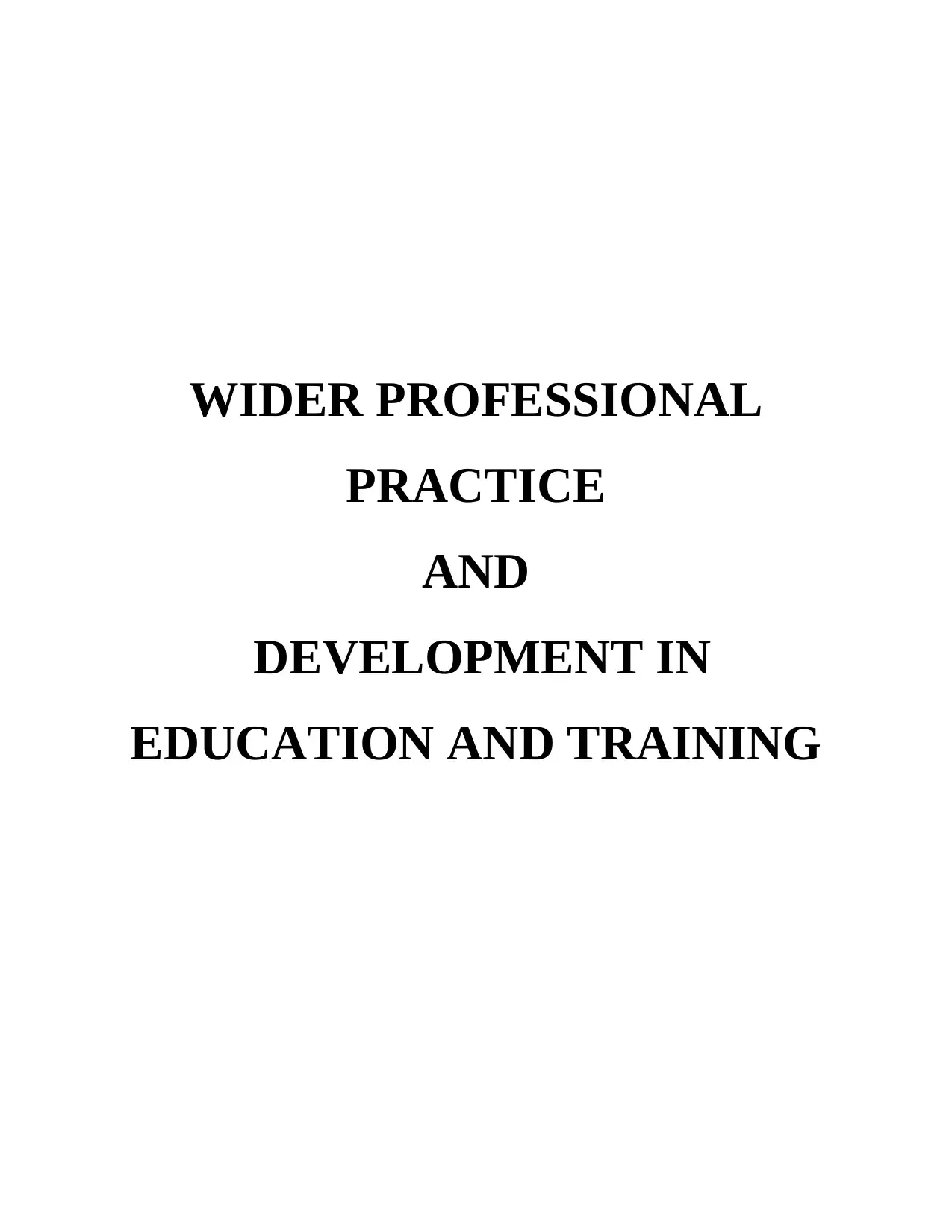
WIDER PROFESSIONAL
PRACTICE
AND
DEVELOPMENT IN
EDUCATION AND TRAINING
PRACTICE
AND
DEVELOPMENT IN
EDUCATION AND TRAINING
Paraphrase This Document
Need a fresh take? Get an instant paraphrase of this document with our AI Paraphraser
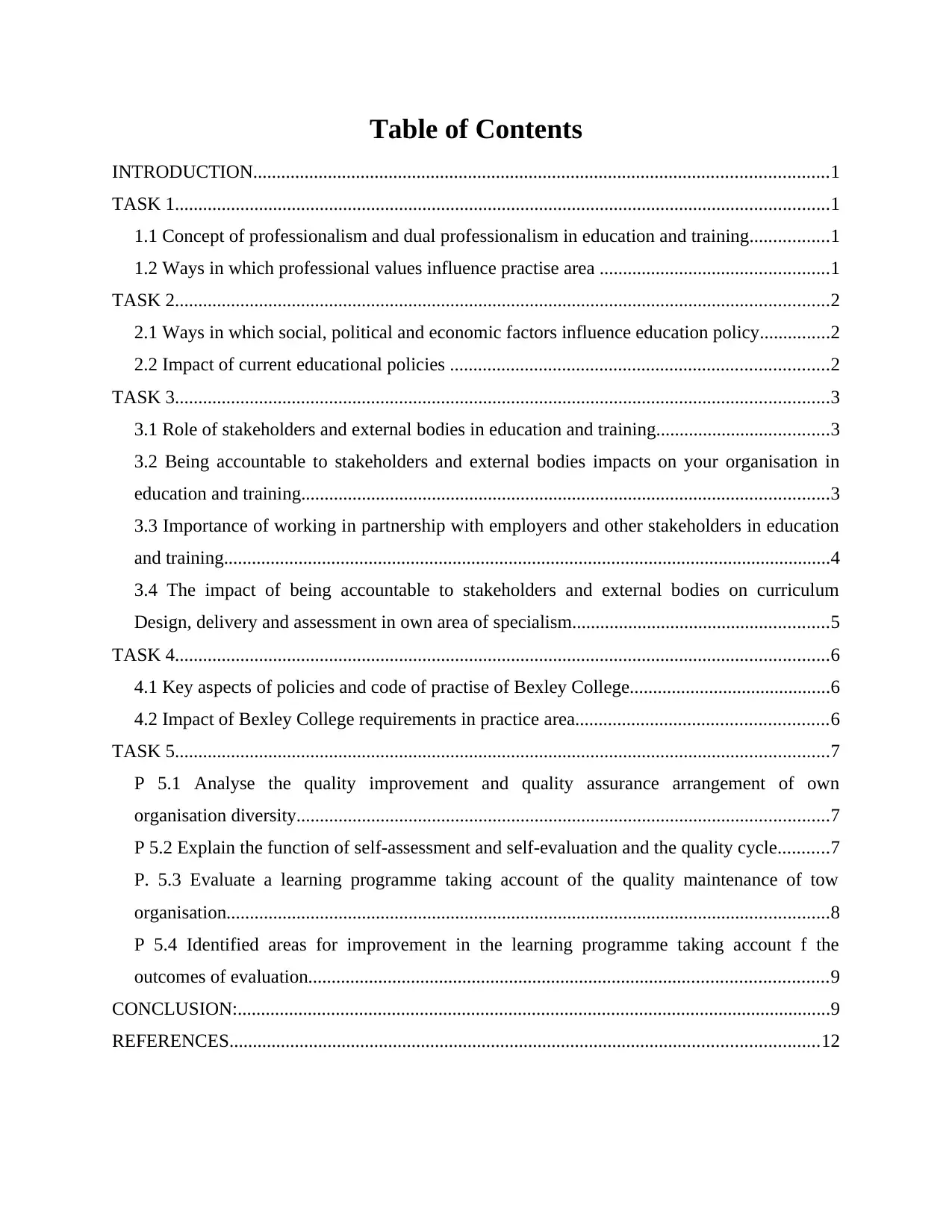
Table of Contents
INTRODUCTION...........................................................................................................................1
TASK 1............................................................................................................................................1
1.1 Concept of professionalism and dual professionalism in education and training.................1
1.2 Ways in which professional values influence practise area .................................................1
TASK 2............................................................................................................................................2
2.1 Ways in which social, political and economic factors influence education policy...............2
2.2 Impact of current educational policies .................................................................................2
TASK 3............................................................................................................................................3
3.1 Role of stakeholders and external bodies in education and training.....................................3
3.2 Being accountable to stakeholders and external bodies impacts on your organisation in
education and training.................................................................................................................3
3.3 Importance of working in partnership with employers and other stakeholders in education
and training..................................................................................................................................4
3.4 The impact of being accountable to stakeholders and external bodies on curriculum
Design, delivery and assessment in own area of specialism.......................................................5
TASK 4............................................................................................................................................6
4.1 Key aspects of policies and code of practise of Bexley College...........................................6
4.2 Impact of Bexley College requirements in practice area......................................................6
TASK 5............................................................................................................................................7
P 5.1 Analyse the quality improvement and quality assurance arrangement of own
organisation diversity..................................................................................................................7
P 5.2 Explain the function of self-assessment and self-evaluation and the quality cycle...........7
P. 5.3 Evaluate a learning programme taking account of the quality maintenance of tow
organisation.................................................................................................................................8
P 5.4 Identified areas for improvement in the learning programme taking account f the
outcomes of evaluation...............................................................................................................9
CONCLUSION:...............................................................................................................................9
REFERENCES..............................................................................................................................12
INTRODUCTION...........................................................................................................................1
TASK 1............................................................................................................................................1
1.1 Concept of professionalism and dual professionalism in education and training.................1
1.2 Ways in which professional values influence practise area .................................................1
TASK 2............................................................................................................................................2
2.1 Ways in which social, political and economic factors influence education policy...............2
2.2 Impact of current educational policies .................................................................................2
TASK 3............................................................................................................................................3
3.1 Role of stakeholders and external bodies in education and training.....................................3
3.2 Being accountable to stakeholders and external bodies impacts on your organisation in
education and training.................................................................................................................3
3.3 Importance of working in partnership with employers and other stakeholders in education
and training..................................................................................................................................4
3.4 The impact of being accountable to stakeholders and external bodies on curriculum
Design, delivery and assessment in own area of specialism.......................................................5
TASK 4............................................................................................................................................6
4.1 Key aspects of policies and code of practise of Bexley College...........................................6
4.2 Impact of Bexley College requirements in practice area......................................................6
TASK 5............................................................................................................................................7
P 5.1 Analyse the quality improvement and quality assurance arrangement of own
organisation diversity..................................................................................................................7
P 5.2 Explain the function of self-assessment and self-evaluation and the quality cycle...........7
P. 5.3 Evaluate a learning programme taking account of the quality maintenance of tow
organisation.................................................................................................................................8
P 5.4 Identified areas for improvement in the learning programme taking account f the
outcomes of evaluation...............................................................................................................9
CONCLUSION:...............................................................................................................................9
REFERENCES..............................................................................................................................12
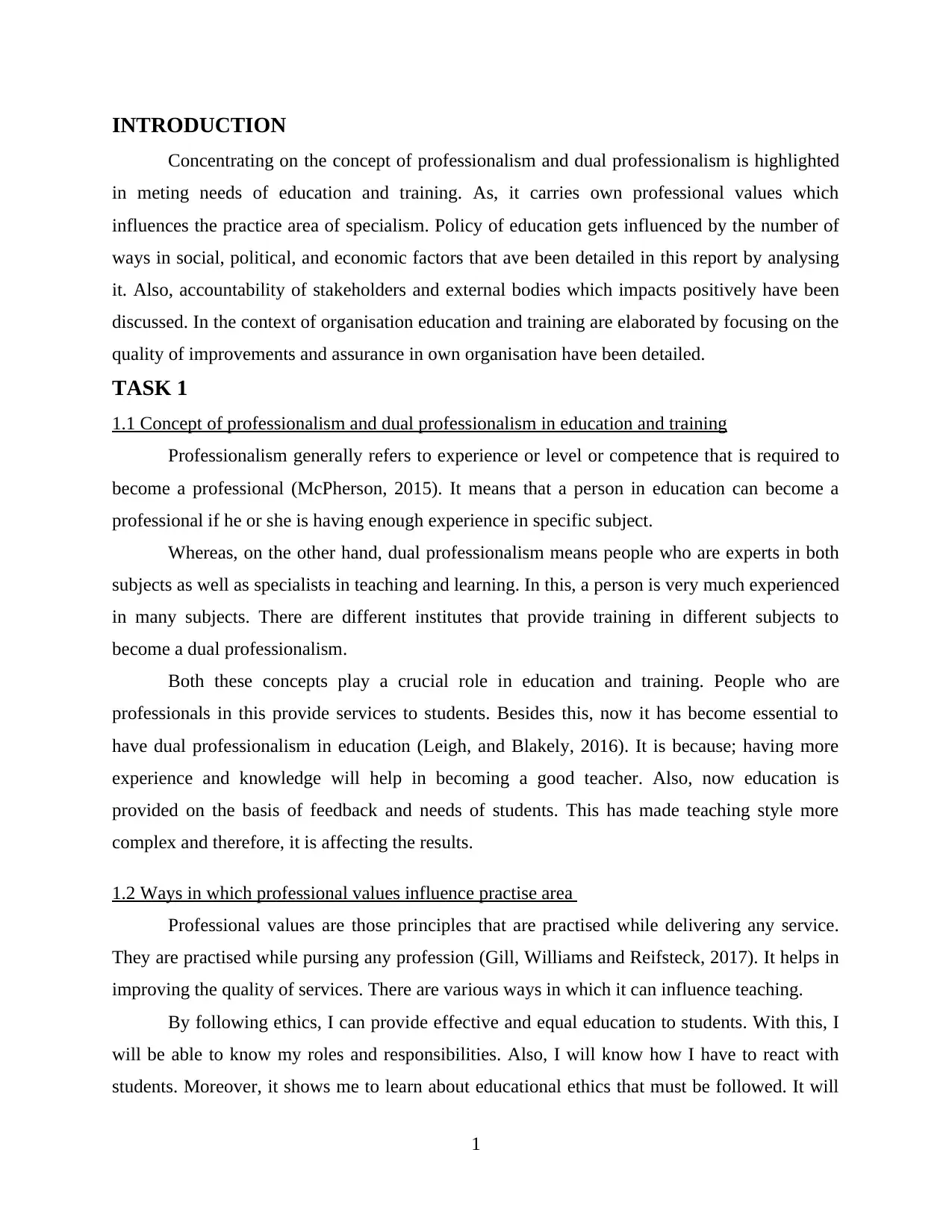
INTRODUCTION
Concentrating on the concept of professionalism and dual professionalism is highlighted
in meting needs of education and training. As, it carries own professional values which
influences the practice area of specialism. Policy of education gets influenced by the number of
ways in social, political, and economic factors that ave been detailed in this report by analysing
it. Also, accountability of stakeholders and external bodies which impacts positively have been
discussed. In the context of organisation education and training are elaborated by focusing on the
quality of improvements and assurance in own organisation have been detailed.
TASK 1
1.1 Concept of professionalism and dual professionalism in education and training
Professionalism generally refers to experience or level or competence that is required to
become a professional (McPherson, 2015). It means that a person in education can become a
professional if he or she is having enough experience in specific subject.
Whereas, on the other hand, dual professionalism means people who are experts in both
subjects as well as specialists in teaching and learning. In this, a person is very much experienced
in many subjects. There are different institutes that provide training in different subjects to
become a dual professionalism.
Both these concepts play a crucial role in education and training. People who are
professionals in this provide services to students. Besides this, now it has become essential to
have dual professionalism in education (Leigh, and Blakely, 2016). It is because; having more
experience and knowledge will help in becoming a good teacher. Also, now education is
provided on the basis of feedback and needs of students. This has made teaching style more
complex and therefore, it is affecting the results.
1.2 Ways in which professional values influence practise area
Professional values are those principles that are practised while delivering any service.
They are practised while pursing any profession (Gill, Williams and Reifsteck, 2017). It helps in
improving the quality of services. There are various ways in which it can influence teaching.
By following ethics, I can provide effective and equal education to students. With this, I
will be able to know my roles and responsibilities. Also, I will know how I have to react with
students. Moreover, it shows me to learn about educational ethics that must be followed. It will
1
Concentrating on the concept of professionalism and dual professionalism is highlighted
in meting needs of education and training. As, it carries own professional values which
influences the practice area of specialism. Policy of education gets influenced by the number of
ways in social, political, and economic factors that ave been detailed in this report by analysing
it. Also, accountability of stakeholders and external bodies which impacts positively have been
discussed. In the context of organisation education and training are elaborated by focusing on the
quality of improvements and assurance in own organisation have been detailed.
TASK 1
1.1 Concept of professionalism and dual professionalism in education and training
Professionalism generally refers to experience or level or competence that is required to
become a professional (McPherson, 2015). It means that a person in education can become a
professional if he or she is having enough experience in specific subject.
Whereas, on the other hand, dual professionalism means people who are experts in both
subjects as well as specialists in teaching and learning. In this, a person is very much experienced
in many subjects. There are different institutes that provide training in different subjects to
become a dual professionalism.
Both these concepts play a crucial role in education and training. People who are
professionals in this provide services to students. Besides this, now it has become essential to
have dual professionalism in education (Leigh, and Blakely, 2016). It is because; having more
experience and knowledge will help in becoming a good teacher. Also, now education is
provided on the basis of feedback and needs of students. This has made teaching style more
complex and therefore, it is affecting the results.
1.2 Ways in which professional values influence practise area
Professional values are those principles that are practised while delivering any service.
They are practised while pursing any profession (Gill, Williams and Reifsteck, 2017). It helps in
improving the quality of services. There are various ways in which it can influence teaching.
By following ethics, I can provide effective and equal education to students. With this, I
will be able to know my roles and responsibilities. Also, I will know how I have to react with
students. Moreover, it shows me to learn about educational ethics that must be followed. It will
1
⊘ This is a preview!⊘
Do you want full access?
Subscribe today to unlock all pages.

Trusted by 1+ million students worldwide
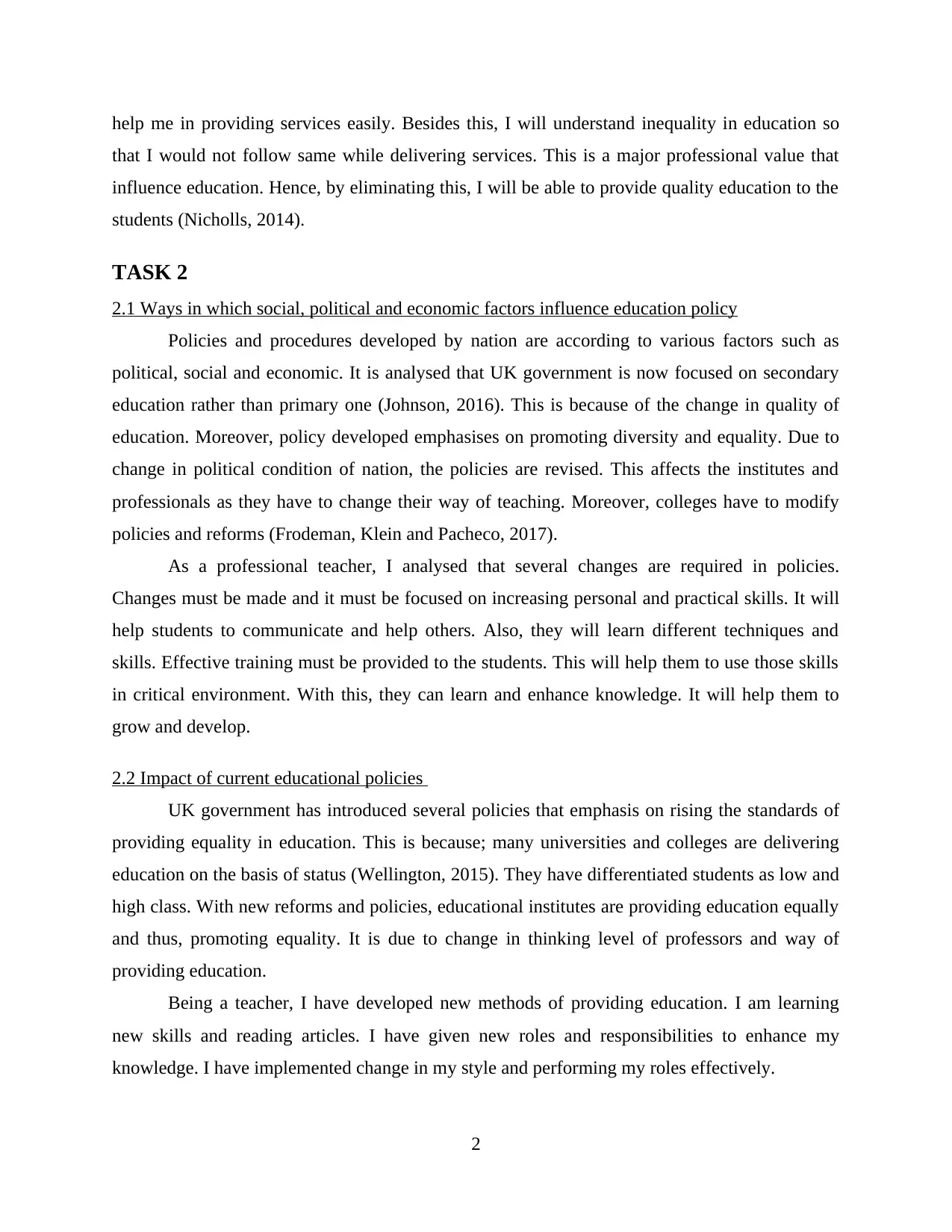
help me in providing services easily. Besides this, I will understand inequality in education so
that I would not follow same while delivering services. This is a major professional value that
influence education. Hence, by eliminating this, I will be able to provide quality education to the
students (Nicholls, 2014).
TASK 2
2.1 Ways in which social, political and economic factors influence education policy
Policies and procedures developed by nation are according to various factors such as
political, social and economic. It is analysed that UK government is now focused on secondary
education rather than primary one (Johnson, 2016). This is because of the change in quality of
education. Moreover, policy developed emphasises on promoting diversity and equality. Due to
change in political condition of nation, the policies are revised. This affects the institutes and
professionals as they have to change their way of teaching. Moreover, colleges have to modify
policies and reforms (Frodeman, Klein and Pacheco, 2017).
As a professional teacher, I analysed that several changes are required in policies.
Changes must be made and it must be focused on increasing personal and practical skills. It will
help students to communicate and help others. Also, they will learn different techniques and
skills. Effective training must be provided to the students. This will help them to use those skills
in critical environment. With this, they can learn and enhance knowledge. It will help them to
grow and develop.
2.2 Impact of current educational policies
UK government has introduced several policies that emphasis on rising the standards of
providing equality in education. This is because; many universities and colleges are delivering
education on the basis of status (Wellington, 2015). They have differentiated students as low and
high class. With new reforms and policies, educational institutes are providing education equally
and thus, promoting equality. It is due to change in thinking level of professors and way of
providing education.
Being a teacher, I have developed new methods of providing education. I am learning
new skills and reading articles. I have given new roles and responsibilities to enhance my
knowledge. I have implemented change in my style and performing my roles effectively.
2
that I would not follow same while delivering services. This is a major professional value that
influence education. Hence, by eliminating this, I will be able to provide quality education to the
students (Nicholls, 2014).
TASK 2
2.1 Ways in which social, political and economic factors influence education policy
Policies and procedures developed by nation are according to various factors such as
political, social and economic. It is analysed that UK government is now focused on secondary
education rather than primary one (Johnson, 2016). This is because of the change in quality of
education. Moreover, policy developed emphasises on promoting diversity and equality. Due to
change in political condition of nation, the policies are revised. This affects the institutes and
professionals as they have to change their way of teaching. Moreover, colleges have to modify
policies and reforms (Frodeman, Klein and Pacheco, 2017).
As a professional teacher, I analysed that several changes are required in policies.
Changes must be made and it must be focused on increasing personal and practical skills. It will
help students to communicate and help others. Also, they will learn different techniques and
skills. Effective training must be provided to the students. This will help them to use those skills
in critical environment. With this, they can learn and enhance knowledge. It will help them to
grow and develop.
2.2 Impact of current educational policies
UK government has introduced several policies that emphasis on rising the standards of
providing equality in education. This is because; many universities and colleges are delivering
education on the basis of status (Wellington, 2015). They have differentiated students as low and
high class. With new reforms and policies, educational institutes are providing education equally
and thus, promoting equality. It is due to change in thinking level of professors and way of
providing education.
Being a teacher, I have developed new methods of providing education. I am learning
new skills and reading articles. I have given new roles and responsibilities to enhance my
knowledge. I have implemented change in my style and performing my roles effectively.
2
Paraphrase This Document
Need a fresh take? Get an instant paraphrase of this document with our AI Paraphraser
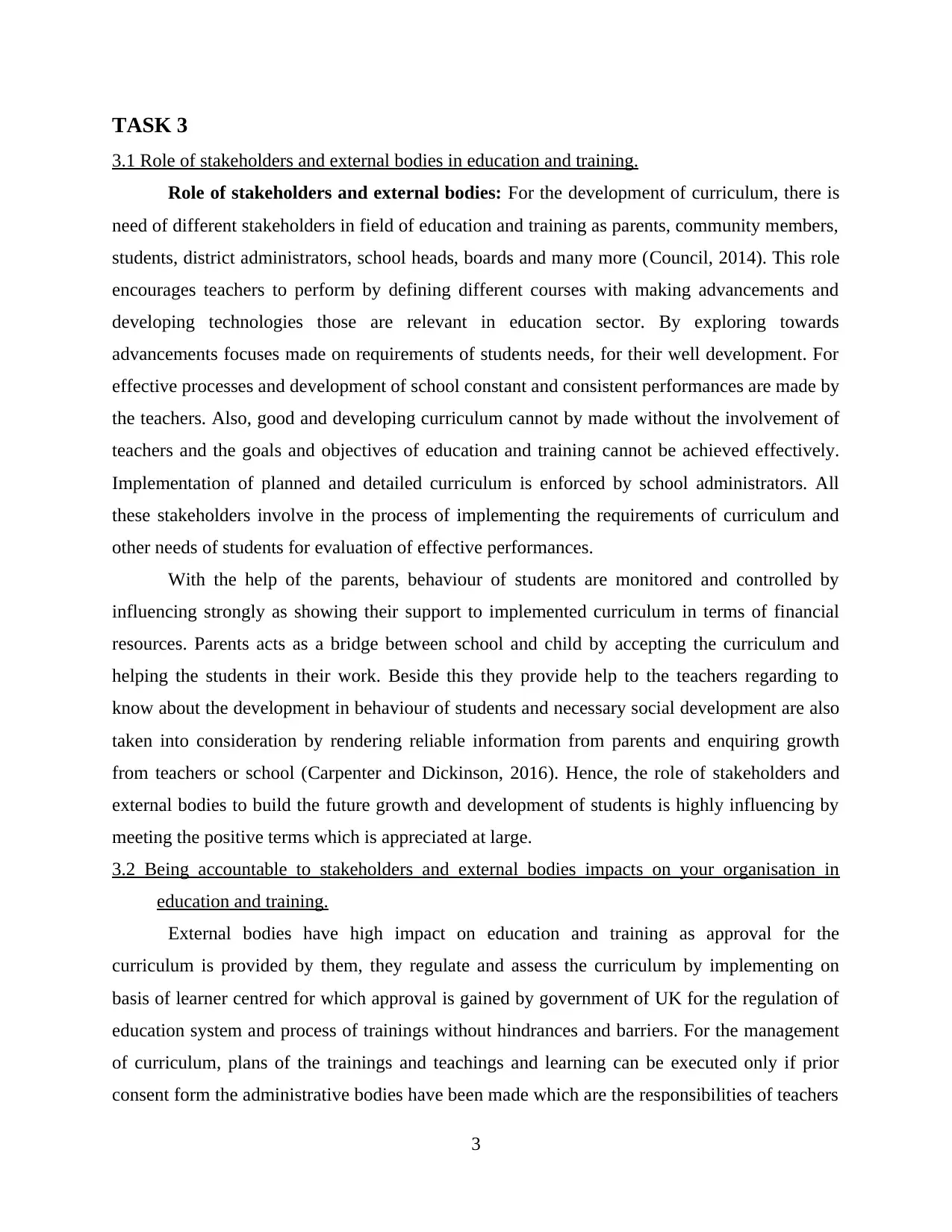
TASK 3
3.1 Role of stakeholders and external bodies in education and training.
Role of stakeholders and external bodies: For the development of curriculum, there is
need of different stakeholders in field of education and training as parents, community members,
students, district administrators, school heads, boards and many more (Council, 2014). This role
encourages teachers to perform by defining different courses with making advancements and
developing technologies those are relevant in education sector. By exploring towards
advancements focuses made on requirements of students needs, for their well development. For
effective processes and development of school constant and consistent performances are made by
the teachers. Also, good and developing curriculum cannot by made without the involvement of
teachers and the goals and objectives of education and training cannot be achieved effectively.
Implementation of planned and detailed curriculum is enforced by school administrators. All
these stakeholders involve in the process of implementing the requirements of curriculum and
other needs of students for evaluation of effective performances.
With the help of the parents, behaviour of students are monitored and controlled by
influencing strongly as showing their support to implemented curriculum in terms of financial
resources. Parents acts as a bridge between school and child by accepting the curriculum and
helping the students in their work. Beside this they provide help to the teachers regarding to
know about the development in behaviour of students and necessary social development are also
taken into consideration by rendering reliable information from parents and enquiring growth
from teachers or school (Carpenter and Dickinson, 2016). Hence, the role of stakeholders and
external bodies to build the future growth and development of students is highly influencing by
meeting the positive terms which is appreciated at large.
3.2 Being accountable to stakeholders and external bodies impacts on your organisation in
education and training.
External bodies have high impact on education and training as approval for the
curriculum is provided by them, they regulate and assess the curriculum by implementing on
basis of learner centred for which approval is gained by government of UK for the regulation of
education system and process of trainings without hindrances and barriers. For the management
of curriculum, plans of the trainings and teachings and learning can be executed only if prior
consent form the administrative bodies have been made which are the responsibilities of teachers
3
3.1 Role of stakeholders and external bodies in education and training.
Role of stakeholders and external bodies: For the development of curriculum, there is
need of different stakeholders in field of education and training as parents, community members,
students, district administrators, school heads, boards and many more (Council, 2014). This role
encourages teachers to perform by defining different courses with making advancements and
developing technologies those are relevant in education sector. By exploring towards
advancements focuses made on requirements of students needs, for their well development. For
effective processes and development of school constant and consistent performances are made by
the teachers. Also, good and developing curriculum cannot by made without the involvement of
teachers and the goals and objectives of education and training cannot be achieved effectively.
Implementation of planned and detailed curriculum is enforced by school administrators. All
these stakeholders involve in the process of implementing the requirements of curriculum and
other needs of students for evaluation of effective performances.
With the help of the parents, behaviour of students are monitored and controlled by
influencing strongly as showing their support to implemented curriculum in terms of financial
resources. Parents acts as a bridge between school and child by accepting the curriculum and
helping the students in their work. Beside this they provide help to the teachers regarding to
know about the development in behaviour of students and necessary social development are also
taken into consideration by rendering reliable information from parents and enquiring growth
from teachers or school (Carpenter and Dickinson, 2016). Hence, the role of stakeholders and
external bodies to build the future growth and development of students is highly influencing by
meeting the positive terms which is appreciated at large.
3.2 Being accountable to stakeholders and external bodies impacts on your organisation in
education and training.
External bodies have high impact on education and training as approval for the
curriculum is provided by them, they regulate and assess the curriculum by implementing on
basis of learner centred for which approval is gained by government of UK for the regulation of
education system and process of trainings without hindrances and barriers. For the management
of curriculum, plans of the trainings and teachings and learning can be executed only if prior
consent form the administrative bodies have been made which are the responsibilities of teachers
3
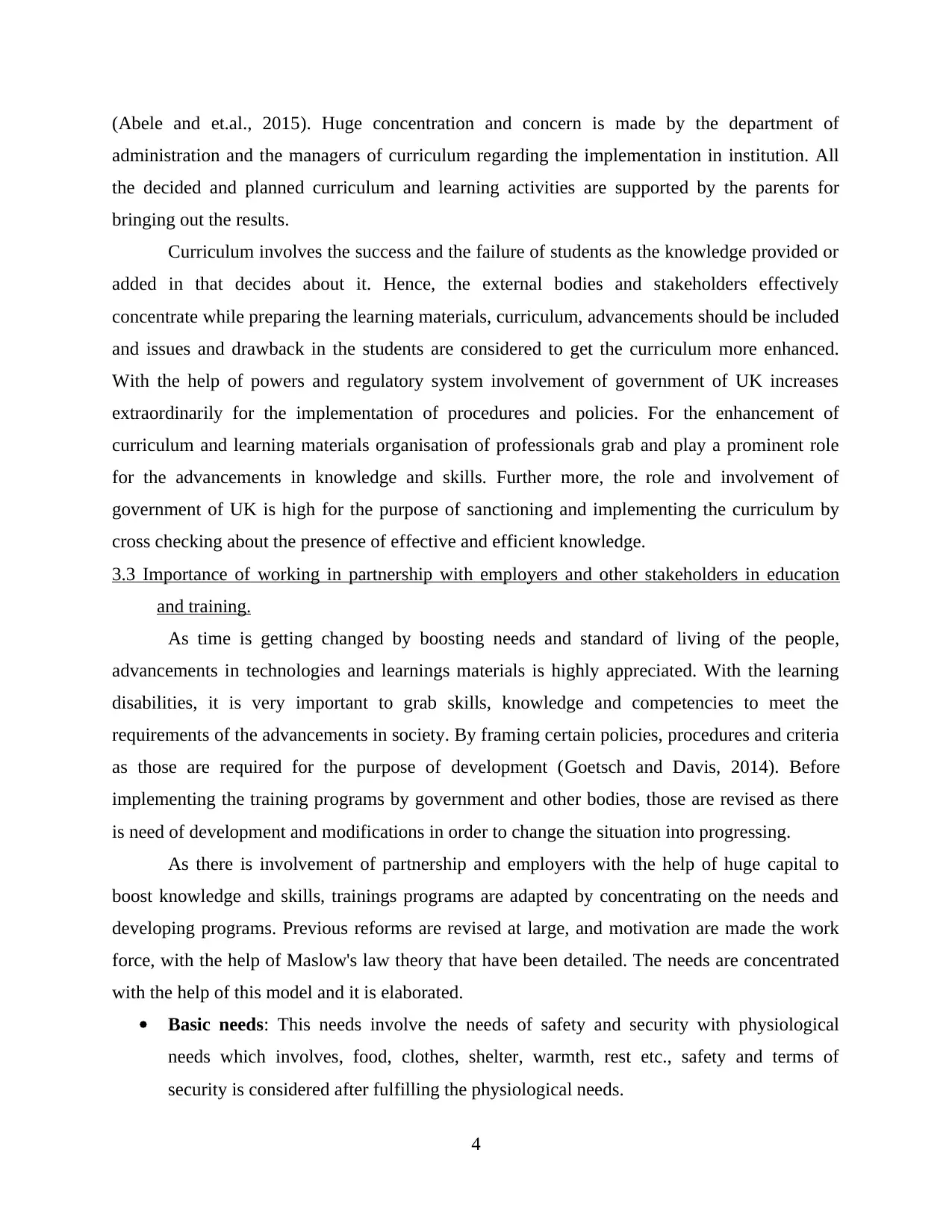
(Abele and et.al., 2015). Huge concentration and concern is made by the department of
administration and the managers of curriculum regarding the implementation in institution. All
the decided and planned curriculum and learning activities are supported by the parents for
bringing out the results.
Curriculum involves the success and the failure of students as the knowledge provided or
added in that decides about it. Hence, the external bodies and stakeholders effectively
concentrate while preparing the learning materials, curriculum, advancements should be included
and issues and drawback in the students are considered to get the curriculum more enhanced.
With the help of powers and regulatory system involvement of government of UK increases
extraordinarily for the implementation of procedures and policies. For the enhancement of
curriculum and learning materials organisation of professionals grab and play a prominent role
for the advancements in knowledge and skills. Further more, the role and involvement of
government of UK is high for the purpose of sanctioning and implementing the curriculum by
cross checking about the presence of effective and efficient knowledge.
3.3 Importance of working in partnership with employers and other stakeholders in education
and training.
As time is getting changed by boosting needs and standard of living of the people,
advancements in technologies and learnings materials is highly appreciated. With the learning
disabilities, it is very important to grab skills, knowledge and competencies to meet the
requirements of the advancements in society. By framing certain policies, procedures and criteria
as those are required for the purpose of development (Goetsch and Davis, 2014). Before
implementing the training programs by government and other bodies, those are revised as there
is need of development and modifications in order to change the situation into progressing.
As there is involvement of partnership and employers with the help of huge capital to
boost knowledge and skills, trainings programs are adapted by concentrating on the needs and
developing programs. Previous reforms are revised at large, and motivation are made the work
force, with the help of Maslow's law theory that have been detailed. The needs are concentrated
with the help of this model and it is elaborated.
Basic needs: This needs involve the needs of safety and security with physiological
needs which involves, food, clothes, shelter, warmth, rest etc., safety and terms of
security is considered after fulfilling the physiological needs.
4
administration and the managers of curriculum regarding the implementation in institution. All
the decided and planned curriculum and learning activities are supported by the parents for
bringing out the results.
Curriculum involves the success and the failure of students as the knowledge provided or
added in that decides about it. Hence, the external bodies and stakeholders effectively
concentrate while preparing the learning materials, curriculum, advancements should be included
and issues and drawback in the students are considered to get the curriculum more enhanced.
With the help of powers and regulatory system involvement of government of UK increases
extraordinarily for the implementation of procedures and policies. For the enhancement of
curriculum and learning materials organisation of professionals grab and play a prominent role
for the advancements in knowledge and skills. Further more, the role and involvement of
government of UK is high for the purpose of sanctioning and implementing the curriculum by
cross checking about the presence of effective and efficient knowledge.
3.3 Importance of working in partnership with employers and other stakeholders in education
and training.
As time is getting changed by boosting needs and standard of living of the people,
advancements in technologies and learnings materials is highly appreciated. With the learning
disabilities, it is very important to grab skills, knowledge and competencies to meet the
requirements of the advancements in society. By framing certain policies, procedures and criteria
as those are required for the purpose of development (Goetsch and Davis, 2014). Before
implementing the training programs by government and other bodies, those are revised as there
is need of development and modifications in order to change the situation into progressing.
As there is involvement of partnership and employers with the help of huge capital to
boost knowledge and skills, trainings programs are adapted by concentrating on the needs and
developing programs. Previous reforms are revised at large, and motivation are made the work
force, with the help of Maslow's law theory that have been detailed. The needs are concentrated
with the help of this model and it is elaborated.
Basic needs: This needs involve the needs of safety and security with physiological
needs which involves, food, clothes, shelter, warmth, rest etc., safety and terms of
security is considered after fulfilling the physiological needs.
4
⊘ This is a preview!⊘
Do you want full access?
Subscribe today to unlock all pages.

Trusted by 1+ million students worldwide
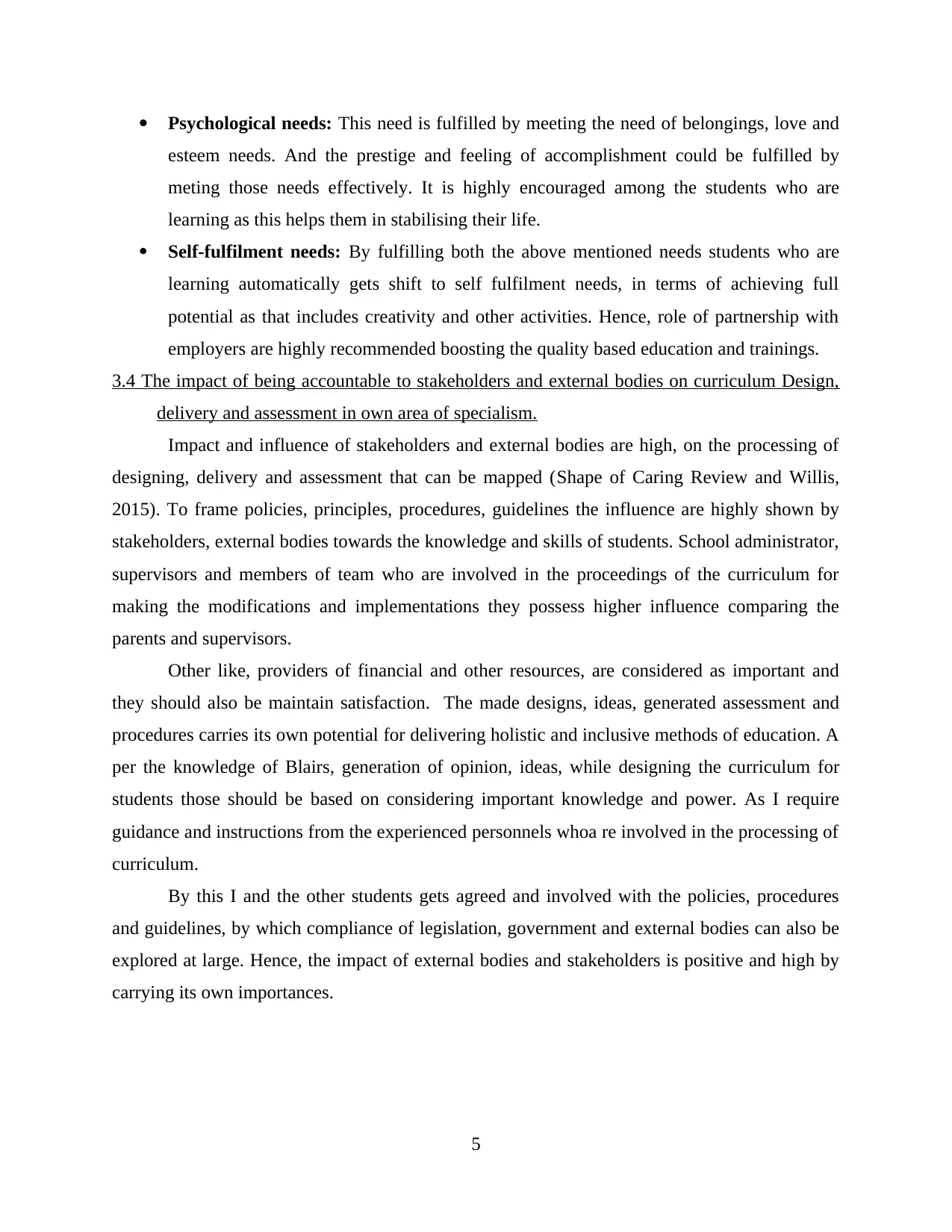
Psychological needs: This need is fulfilled by meeting the need of belongings, love and
esteem needs. And the prestige and feeling of accomplishment could be fulfilled by
meting those needs effectively. It is highly encouraged among the students who are
learning as this helps them in stabilising their life.
Self-fulfilment needs: By fulfilling both the above mentioned needs students who are
learning automatically gets shift to self fulfilment needs, in terms of achieving full
potential as that includes creativity and other activities. Hence, role of partnership with
employers are highly recommended boosting the quality based education and trainings.
3.4 The impact of being accountable to stakeholders and external bodies on curriculum Design,
delivery and assessment in own area of specialism.
Impact and influence of stakeholders and external bodies are high, on the processing of
designing, delivery and assessment that can be mapped (Shape of Caring Review and Willis,
2015). To frame policies, principles, procedures, guidelines the influence are highly shown by
stakeholders, external bodies towards the knowledge and skills of students. School administrator,
supervisors and members of team who are involved in the proceedings of the curriculum for
making the modifications and implementations they possess higher influence comparing the
parents and supervisors.
Other like, providers of financial and other resources, are considered as important and
they should also be maintain satisfaction. The made designs, ideas, generated assessment and
procedures carries its own potential for delivering holistic and inclusive methods of education. A
per the knowledge of Blairs, generation of opinion, ideas, while designing the curriculum for
students those should be based on considering important knowledge and power. As I require
guidance and instructions from the experienced personnels whoa re involved in the processing of
curriculum.
By this I and the other students gets agreed and involved with the policies, procedures
and guidelines, by which compliance of legislation, government and external bodies can also be
explored at large. Hence, the impact of external bodies and stakeholders is positive and high by
carrying its own importances.
5
esteem needs. And the prestige and feeling of accomplishment could be fulfilled by
meting those needs effectively. It is highly encouraged among the students who are
learning as this helps them in stabilising their life.
Self-fulfilment needs: By fulfilling both the above mentioned needs students who are
learning automatically gets shift to self fulfilment needs, in terms of achieving full
potential as that includes creativity and other activities. Hence, role of partnership with
employers are highly recommended boosting the quality based education and trainings.
3.4 The impact of being accountable to stakeholders and external bodies on curriculum Design,
delivery and assessment in own area of specialism.
Impact and influence of stakeholders and external bodies are high, on the processing of
designing, delivery and assessment that can be mapped (Shape of Caring Review and Willis,
2015). To frame policies, principles, procedures, guidelines the influence are highly shown by
stakeholders, external bodies towards the knowledge and skills of students. School administrator,
supervisors and members of team who are involved in the proceedings of the curriculum for
making the modifications and implementations they possess higher influence comparing the
parents and supervisors.
Other like, providers of financial and other resources, are considered as important and
they should also be maintain satisfaction. The made designs, ideas, generated assessment and
procedures carries its own potential for delivering holistic and inclusive methods of education. A
per the knowledge of Blairs, generation of opinion, ideas, while designing the curriculum for
students those should be based on considering important knowledge and power. As I require
guidance and instructions from the experienced personnels whoa re involved in the processing of
curriculum.
By this I and the other students gets agreed and involved with the policies, procedures
and guidelines, by which compliance of legislation, government and external bodies can also be
explored at large. Hence, the impact of external bodies and stakeholders is positive and high by
carrying its own importances.
5
Paraphrase This Document
Need a fresh take? Get an instant paraphrase of this document with our AI Paraphraser
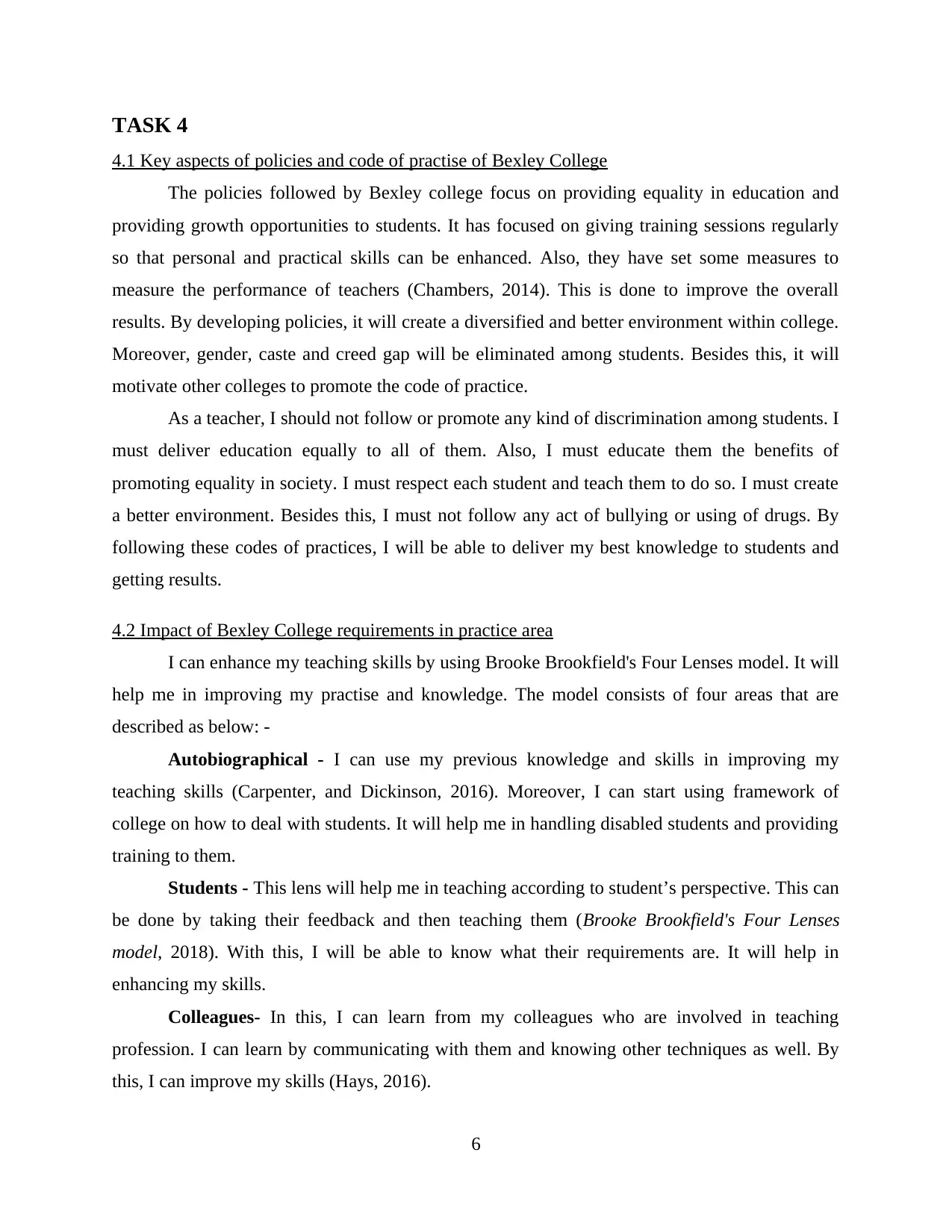
TASK 4
4.1 Key aspects of policies and code of practise of Bexley College
The policies followed by Bexley college focus on providing equality in education and
providing growth opportunities to students. It has focused on giving training sessions regularly
so that personal and practical skills can be enhanced. Also, they have set some measures to
measure the performance of teachers (Chambers, 2014). This is done to improve the overall
results. By developing policies, it will create a diversified and better environment within college.
Moreover, gender, caste and creed gap will be eliminated among students. Besides this, it will
motivate other colleges to promote the code of practice.
As a teacher, I should not follow or promote any kind of discrimination among students. I
must deliver education equally to all of them. Also, I must educate them the benefits of
promoting equality in society. I must respect each student and teach them to do so. I must create
a better environment. Besides this, I must not follow any act of bullying or using of drugs. By
following these codes of practices, I will be able to deliver my best knowledge to students and
getting results.
4.2 Impact of Bexley College requirements in practice area
I can enhance my teaching skills by using Brooke Brookfield's Four Lenses model. It will
help me in improving my practise and knowledge. The model consists of four areas that are
described as below: -
Autobiographical - I can use my previous knowledge and skills in improving my
teaching skills (Carpenter, and Dickinson, 2016). Moreover, I can start using framework of
college on how to deal with students. It will help me in handling disabled students and providing
training to them.
Students - This lens will help me in teaching according to student’s perspective. This can
be done by taking their feedback and then teaching them (Brooke Brookfield's Four Lenses
model, 2018). With this, I will be able to know what their requirements are. It will help in
enhancing my skills.
Colleagues- In this, I can learn from my colleagues who are involved in teaching
profession. I can learn by communicating with them and knowing other techniques as well. By
this, I can improve my skills (Hays, 2016).
6
4.1 Key aspects of policies and code of practise of Bexley College
The policies followed by Bexley college focus on providing equality in education and
providing growth opportunities to students. It has focused on giving training sessions regularly
so that personal and practical skills can be enhanced. Also, they have set some measures to
measure the performance of teachers (Chambers, 2014). This is done to improve the overall
results. By developing policies, it will create a diversified and better environment within college.
Moreover, gender, caste and creed gap will be eliminated among students. Besides this, it will
motivate other colleges to promote the code of practice.
As a teacher, I should not follow or promote any kind of discrimination among students. I
must deliver education equally to all of them. Also, I must educate them the benefits of
promoting equality in society. I must respect each student and teach them to do so. I must create
a better environment. Besides this, I must not follow any act of bullying or using of drugs. By
following these codes of practices, I will be able to deliver my best knowledge to students and
getting results.
4.2 Impact of Bexley College requirements in practice area
I can enhance my teaching skills by using Brooke Brookfield's Four Lenses model. It will
help me in improving my practise and knowledge. The model consists of four areas that are
described as below: -
Autobiographical - I can use my previous knowledge and skills in improving my
teaching skills (Carpenter, and Dickinson, 2016). Moreover, I can start using framework of
college on how to deal with students. It will help me in handling disabled students and providing
training to them.
Students - This lens will help me in teaching according to student’s perspective. This can
be done by taking their feedback and then teaching them (Brooke Brookfield's Four Lenses
model, 2018). With this, I will be able to know what their requirements are. It will help in
enhancing my skills.
Colleagues- In this, I can learn from my colleagues who are involved in teaching
profession. I can learn by communicating with them and knowing other techniques as well. By
this, I can improve my skills (Hays, 2016).
6
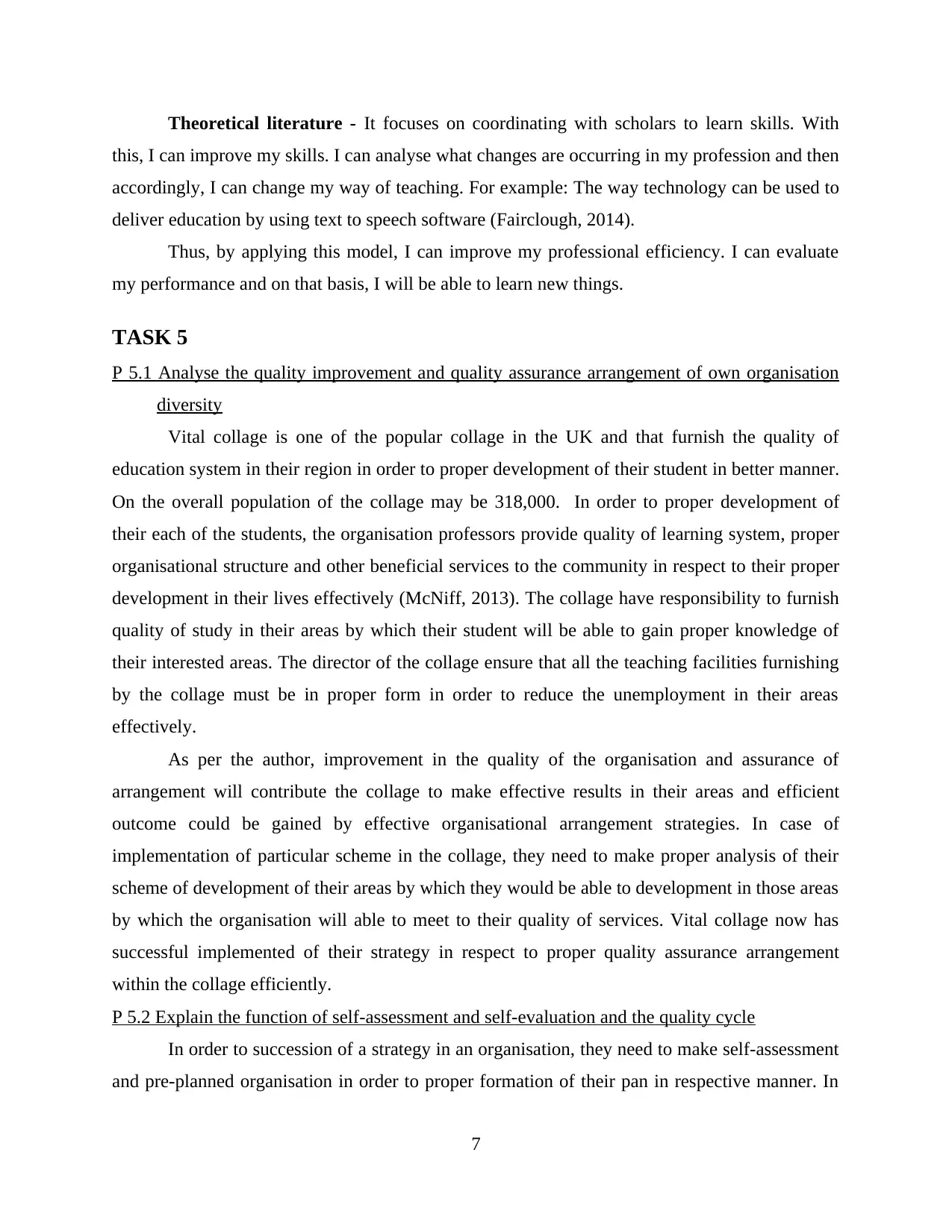
Theoretical literature - It focuses on coordinating with scholars to learn skills. With
this, I can improve my skills. I can analyse what changes are occurring in my profession and then
accordingly, I can change my way of teaching. For example: The way technology can be used to
deliver education by using text to speech software (Fairclough, 2014).
Thus, by applying this model, I can improve my professional efficiency. I can evaluate
my performance and on that basis, I will be able to learn new things.
TASK 5
P 5.1 Analyse the quality improvement and quality assurance arrangement of own organisation
diversity
Vital collage is one of the popular collage in the UK and that furnish the quality of
education system in their region in order to proper development of their student in better manner.
On the overall population of the collage may be 318,000. In order to proper development of
their each of the students, the organisation professors provide quality of learning system, proper
organisational structure and other beneficial services to the community in respect to their proper
development in their lives effectively (McNiff, 2013). The collage have responsibility to furnish
quality of study in their areas by which their student will be able to gain proper knowledge of
their interested areas. The director of the collage ensure that all the teaching facilities furnishing
by the collage must be in proper form in order to reduce the unemployment in their areas
effectively.
As per the author, improvement in the quality of the organisation and assurance of
arrangement will contribute the collage to make effective results in their areas and efficient
outcome could be gained by effective organisational arrangement strategies. In case of
implementation of particular scheme in the collage, they need to make proper analysis of their
scheme of development of their areas by which they would be able to development in those areas
by which the organisation will able to meet to their quality of services. Vital collage now has
successful implemented of their strategy in respect to proper quality assurance arrangement
within the collage efficiently.
P 5.2 Explain the function of self-assessment and self-evaluation and the quality cycle
In order to succession of a strategy in an organisation, they need to make self-assessment
and pre-planned organisation in order to proper formation of their pan in respective manner. In
7
this, I can improve my skills. I can analyse what changes are occurring in my profession and then
accordingly, I can change my way of teaching. For example: The way technology can be used to
deliver education by using text to speech software (Fairclough, 2014).
Thus, by applying this model, I can improve my professional efficiency. I can evaluate
my performance and on that basis, I will be able to learn new things.
TASK 5
P 5.1 Analyse the quality improvement and quality assurance arrangement of own organisation
diversity
Vital collage is one of the popular collage in the UK and that furnish the quality of
education system in their region in order to proper development of their student in better manner.
On the overall population of the collage may be 318,000. In order to proper development of
their each of the students, the organisation professors provide quality of learning system, proper
organisational structure and other beneficial services to the community in respect to their proper
development in their lives effectively (McNiff, 2013). The collage have responsibility to furnish
quality of study in their areas by which their student will be able to gain proper knowledge of
their interested areas. The director of the collage ensure that all the teaching facilities furnishing
by the collage must be in proper form in order to reduce the unemployment in their areas
effectively.
As per the author, improvement in the quality of the organisation and assurance of
arrangement will contribute the collage to make effective results in their areas and efficient
outcome could be gained by effective organisational arrangement strategies. In case of
implementation of particular scheme in the collage, they need to make proper analysis of their
scheme of development of their areas by which they would be able to development in those areas
by which the organisation will able to meet to their quality of services. Vital collage now has
successful implemented of their strategy in respect to proper quality assurance arrangement
within the collage efficiently.
P 5.2 Explain the function of self-assessment and self-evaluation and the quality cycle
In order to succession of a strategy in an organisation, they need to make self-assessment
and pre-planned organisation in order to proper formation of their pan in respective manner. In
7
⊘ This is a preview!⊘
Do you want full access?
Subscribe today to unlock all pages.

Trusted by 1+ million students worldwide
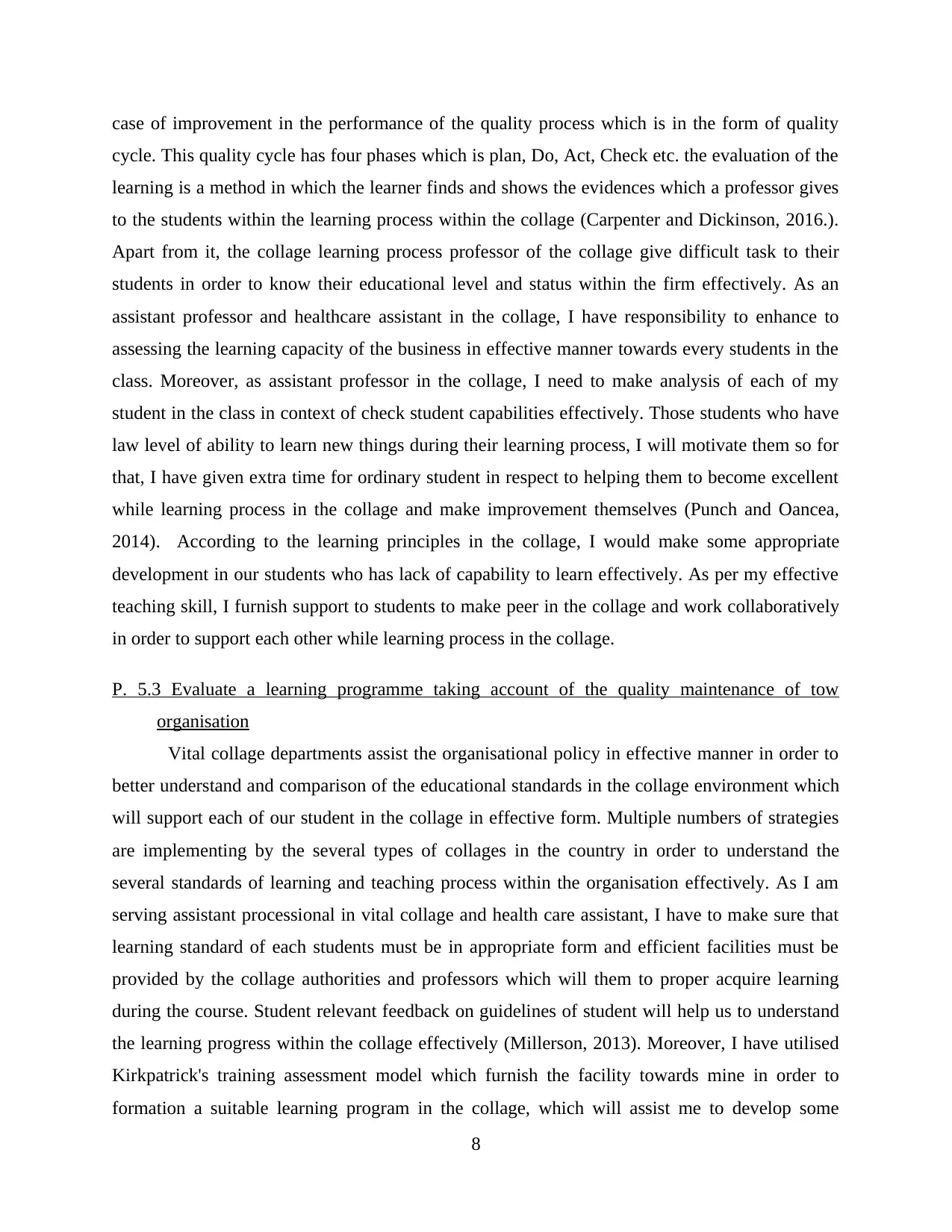
case of improvement in the performance of the quality process which is in the form of quality
cycle. This quality cycle has four phases which is plan, Do, Act, Check etc. the evaluation of the
learning is a method in which the learner finds and shows the evidences which a professor gives
to the students within the learning process within the collage (Carpenter and Dickinson, 2016.).
Apart from it, the collage learning process professor of the collage give difficult task to their
students in order to know their educational level and status within the firm effectively. As an
assistant professor and healthcare assistant in the collage, I have responsibility to enhance to
assessing the learning capacity of the business in effective manner towards every students in the
class. Moreover, as assistant professor in the collage, I need to make analysis of each of my
student in the class in context of check student capabilities effectively. Those students who have
law level of ability to learn new things during their learning process, I will motivate them so for
that, I have given extra time for ordinary student in respect to helping them to become excellent
while learning process in the collage and make improvement themselves (Punch and Oancea,
2014). According to the learning principles in the collage, I would make some appropriate
development in our students who has lack of capability to learn effectively. As per my effective
teaching skill, I furnish support to students to make peer in the collage and work collaboratively
in order to support each other while learning process in the collage.
P. 5.3 Evaluate a learning programme taking account of the quality maintenance of tow
organisation
Vital collage departments assist the organisational policy in effective manner in order to
better understand and comparison of the educational standards in the collage environment which
will support each of our student in the collage in effective form. Multiple numbers of strategies
are implementing by the several types of collages in the country in order to understand the
several standards of learning and teaching process within the organisation effectively. As I am
serving assistant processional in vital collage and health care assistant, I have to make sure that
learning standard of each students must be in appropriate form and efficient facilities must be
provided by the collage authorities and professors which will them to proper acquire learning
during the course. Student relevant feedback on guidelines of student will help us to understand
the learning progress within the collage effectively (Millerson, 2013). Moreover, I have utilised
Kirkpatrick's training assessment model which furnish the facility towards mine in order to
formation a suitable learning program in the collage, which will assist me to develop some
8
cycle. This quality cycle has four phases which is plan, Do, Act, Check etc. the evaluation of the
learning is a method in which the learner finds and shows the evidences which a professor gives
to the students within the learning process within the collage (Carpenter and Dickinson, 2016.).
Apart from it, the collage learning process professor of the collage give difficult task to their
students in order to know their educational level and status within the firm effectively. As an
assistant professor and healthcare assistant in the collage, I have responsibility to enhance to
assessing the learning capacity of the business in effective manner towards every students in the
class. Moreover, as assistant professor in the collage, I need to make analysis of each of my
student in the class in context of check student capabilities effectively. Those students who have
law level of ability to learn new things during their learning process, I will motivate them so for
that, I have given extra time for ordinary student in respect to helping them to become excellent
while learning process in the collage and make improvement themselves (Punch and Oancea,
2014). According to the learning principles in the collage, I would make some appropriate
development in our students who has lack of capability to learn effectively. As per my effective
teaching skill, I furnish support to students to make peer in the collage and work collaboratively
in order to support each other while learning process in the collage.
P. 5.3 Evaluate a learning programme taking account of the quality maintenance of tow
organisation
Vital collage departments assist the organisational policy in effective manner in order to
better understand and comparison of the educational standards in the collage environment which
will support each of our student in the collage in effective form. Multiple numbers of strategies
are implementing by the several types of collages in the country in order to understand the
several standards of learning and teaching process within the organisation effectively. As I am
serving assistant processional in vital collage and health care assistant, I have to make sure that
learning standard of each students must be in appropriate form and efficient facilities must be
provided by the collage authorities and professors which will them to proper acquire learning
during the course. Student relevant feedback on guidelines of student will help us to understand
the learning progress within the collage effectively (Millerson, 2013). Moreover, I have utilised
Kirkpatrick's training assessment model which furnish the facility towards mine in order to
formation a suitable learning program in the collage, which will assist me to develop some
8
Paraphrase This Document
Need a fresh take? Get an instant paraphrase of this document with our AI Paraphraser
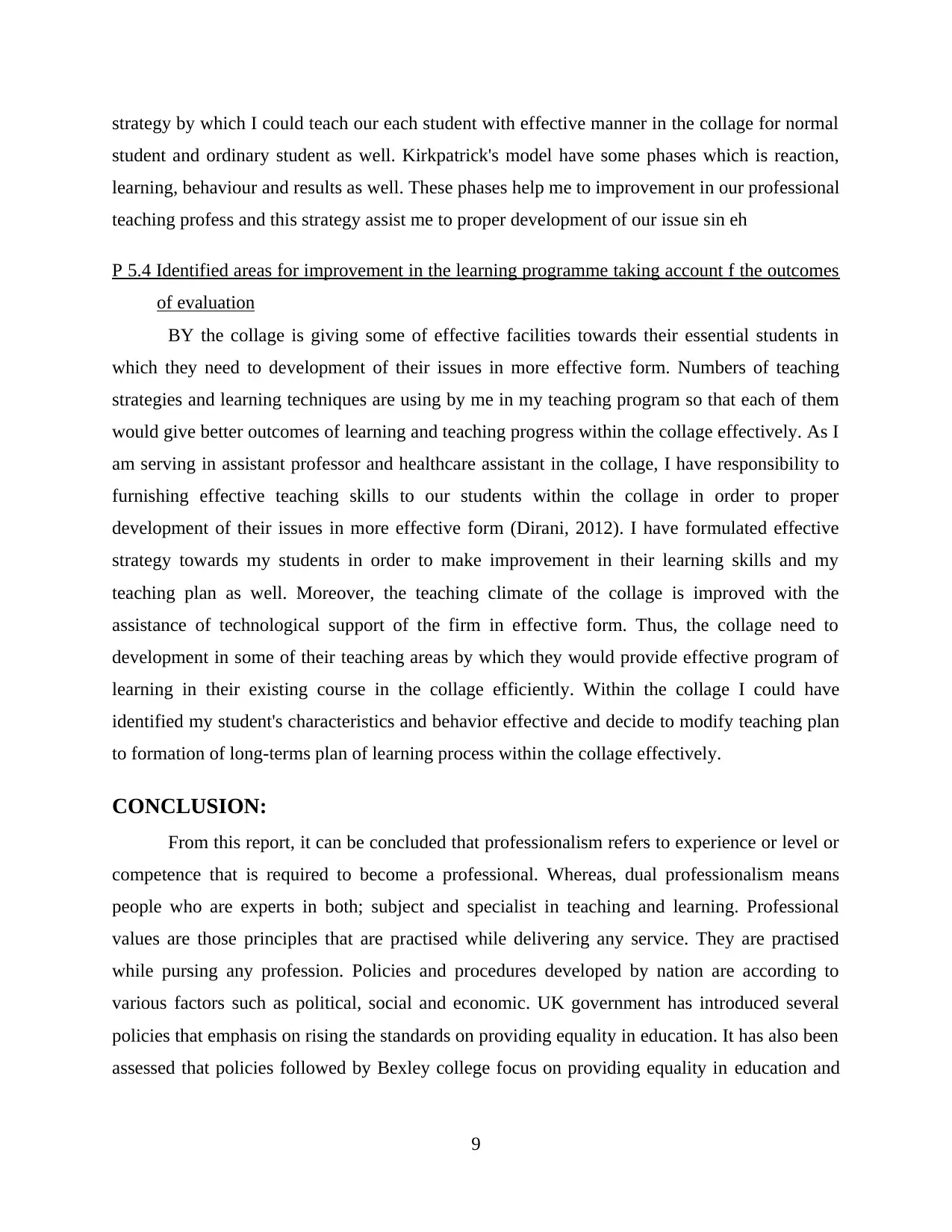
strategy by which I could teach our each student with effective manner in the collage for normal
student and ordinary student as well. Kirkpatrick's model have some phases which is reaction,
learning, behaviour and results as well. These phases help me to improvement in our professional
teaching profess and this strategy assist me to proper development of our issue sin eh
P 5.4 Identified areas for improvement in the learning programme taking account f the outcomes
of evaluation
BY the collage is giving some of effective facilities towards their essential students in
which they need to development of their issues in more effective form. Numbers of teaching
strategies and learning techniques are using by me in my teaching program so that each of them
would give better outcomes of learning and teaching progress within the collage effectively. As I
am serving in assistant professor and healthcare assistant in the collage, I have responsibility to
furnishing effective teaching skills to our students within the collage in order to proper
development of their issues in more effective form (Dirani, 2012). I have formulated effective
strategy towards my students in order to make improvement in their learning skills and my
teaching plan as well. Moreover, the teaching climate of the collage is improved with the
assistance of technological support of the firm in effective form. Thus, the collage need to
development in some of their teaching areas by which they would provide effective program of
learning in their existing course in the collage efficiently. Within the collage I could have
identified my student's characteristics and behavior effective and decide to modify teaching plan
to formation of long-terms plan of learning process within the collage effectively.
CONCLUSION:
From this report, it can be concluded that professionalism refers to experience or level or
competence that is required to become a professional. Whereas, dual professionalism means
people who are experts in both; subject and specialist in teaching and learning. Professional
values are those principles that are practised while delivering any service. They are practised
while pursing any profession. Policies and procedures developed by nation are according to
various factors such as political, social and economic. UK government has introduced several
policies that emphasis on rising the standards on providing equality in education. It has also been
assessed that policies followed by Bexley college focus on providing equality in education and
9
student and ordinary student as well. Kirkpatrick's model have some phases which is reaction,
learning, behaviour and results as well. These phases help me to improvement in our professional
teaching profess and this strategy assist me to proper development of our issue sin eh
P 5.4 Identified areas for improvement in the learning programme taking account f the outcomes
of evaluation
BY the collage is giving some of effective facilities towards their essential students in
which they need to development of their issues in more effective form. Numbers of teaching
strategies and learning techniques are using by me in my teaching program so that each of them
would give better outcomes of learning and teaching progress within the collage effectively. As I
am serving in assistant professor and healthcare assistant in the collage, I have responsibility to
furnishing effective teaching skills to our students within the collage in order to proper
development of their issues in more effective form (Dirani, 2012). I have formulated effective
strategy towards my students in order to make improvement in their learning skills and my
teaching plan as well. Moreover, the teaching climate of the collage is improved with the
assistance of technological support of the firm in effective form. Thus, the collage need to
development in some of their teaching areas by which they would provide effective program of
learning in their existing course in the collage efficiently. Within the collage I could have
identified my student's characteristics and behavior effective and decide to modify teaching plan
to formation of long-terms plan of learning process within the collage effectively.
CONCLUSION:
From this report, it can be concluded that professionalism refers to experience or level or
competence that is required to become a professional. Whereas, dual professionalism means
people who are experts in both; subject and specialist in teaching and learning. Professional
values are those principles that are practised while delivering any service. They are practised
while pursing any profession. Policies and procedures developed by nation are according to
various factors such as political, social and economic. UK government has introduced several
policies that emphasis on rising the standards on providing equality in education. It has also been
assessed that policies followed by Bexley college focus on providing equality in education and
9
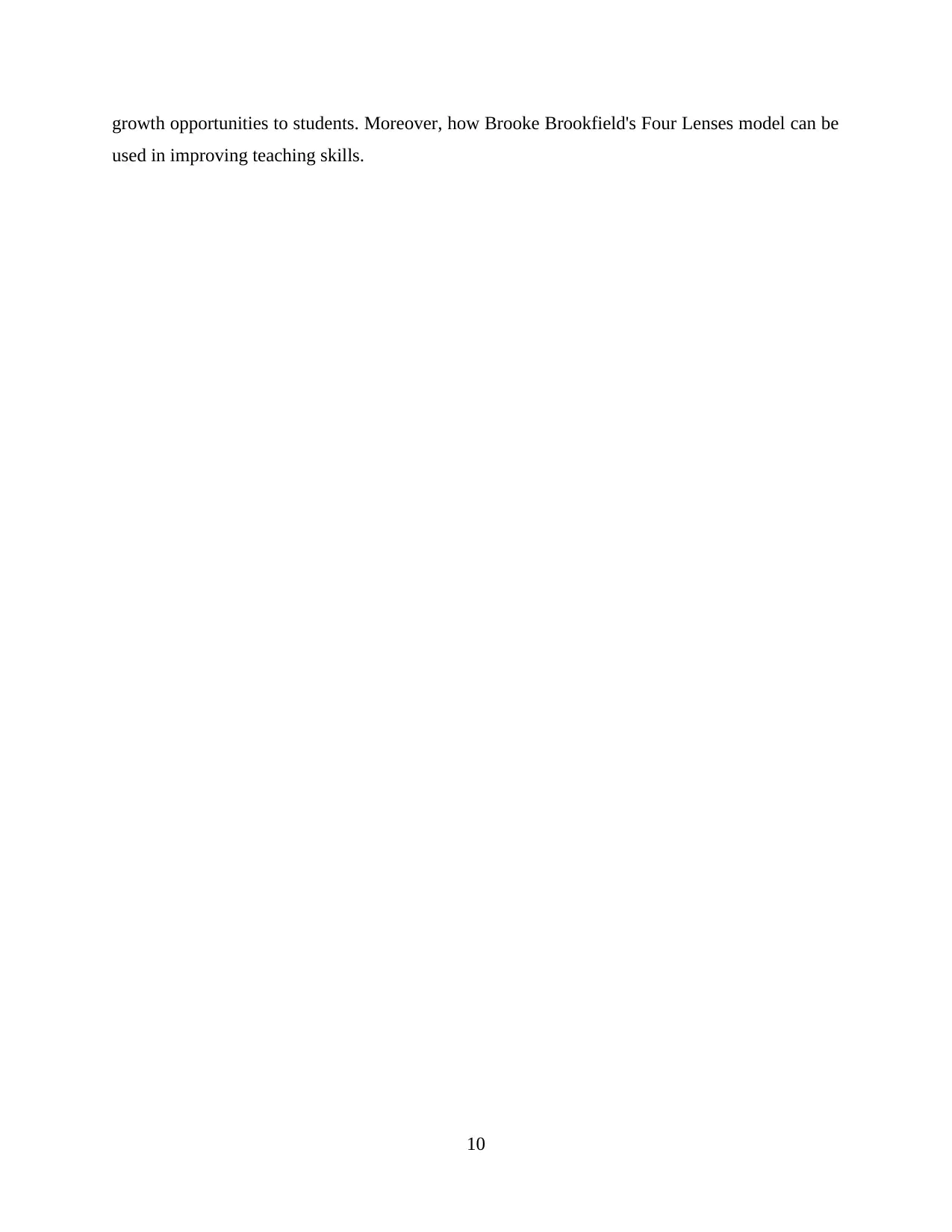
growth opportunities to students. Moreover, how Brooke Brookfield's Four Lenses model can be
used in improving teaching skills.
10
used in improving teaching skills.
10
⊘ This is a preview!⊘
Do you want full access?
Subscribe today to unlock all pages.

Trusted by 1+ million students worldwide
1 out of 15
Related Documents
Your All-in-One AI-Powered Toolkit for Academic Success.
+13062052269
info@desklib.com
Available 24*7 on WhatsApp / Email
![[object Object]](/_next/static/media/star-bottom.7253800d.svg)
Unlock your academic potential
Copyright © 2020–2026 A2Z Services. All Rights Reserved. Developed and managed by ZUCOL.




